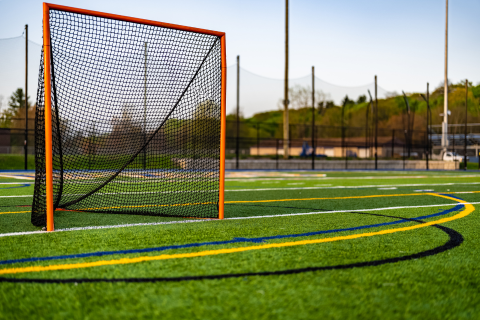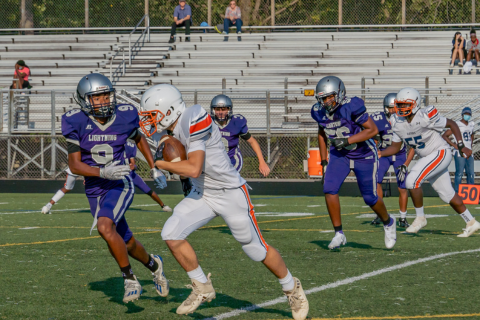 There are countless wonderful things about youth sports, but it’s also true that there are high expectations placed on young athletes. Recently, there’s been a trend towards sports specialization at an early age. This is motivated by trying to help children achieve greatness similar to figures like Shaun White, Wayne Gretzky, or Venus and Serena Williams. All of these athletes started playing their sport when they were toddlers. While the intention to support early sports specialization might be that “practice makes perfect”, specializing in one sport early on in life can take the novelty or fun out of athletics, lead to overuse injuries from repetitive motions, and increase feelings of burnout.
There are countless wonderful things about youth sports, but it’s also true that there are high expectations placed on young athletes. Recently, there’s been a trend towards sports specialization at an early age. This is motivated by trying to help children achieve greatness similar to figures like Shaun White, Wayne Gretzky, or Venus and Serena Williams. All of these athletes started playing their sport when they were toddlers. While the intention to support early sports specialization might be that “practice makes perfect”, specializing in one sport early on in life can take the novelty or fun out of athletics, lead to overuse injuries from repetitive motions, and increase feelings of burnout.
There is another potentially serious problem that is less frequently discussed: a premature focus on sport can inhibit your child’s identity development. The research shows that “identity foreclosure” occurs when kids invest their self-worth, identity, and value into one role (e.g., that of an athlete), leaving other roles unexplored. Early sport specialization directly conflicts with the important developmental phase of exploring lots of interests. Athletic identity foreclosure makes kids feel their value and self-worth is related to how well they perform as an athlete, which can leave kids vulnerable to a rollercoaster of emotions. In the long run, if your child specializes in sports too early in life, they may not be able to fully explore their different interests, which could cause difficulties finding a fulfilling career path later in life. It’s essential that kids of all ages engage in the developmental tasks necessary for career exploration. So, what can sports moms do?
 To encourage kids’ exploration of multiple sports and roles, parents can help by listening to their children about what they think might be fun or may sound interesting. Providing opportunities for kids to play different sports also provides a sense of autonomy, teaching children the value of their voice and accountability to choices they make. This short video about sport sampling with ESPN Broadcaster Cassidy Hubbarth emphasizes that encouraging kids to explore different activities can allow them to explore who they truly are and teach them different skills in each sport. It also shows how Hubbarth’s love of sports remained central to her identity as she “bounced around” learning more about herself before working for ESPN.
To encourage kids’ exploration of multiple sports and roles, parents can help by listening to their children about what they think might be fun or may sound interesting. Providing opportunities for kids to play different sports also provides a sense of autonomy, teaching children the value of their voice and accountability to choices they make. This short video about sport sampling with ESPN Broadcaster Cassidy Hubbarth emphasizes that encouraging kids to explore different activities can allow them to explore who they truly are and teach them different skills in each sport. It also shows how Hubbarth’s love of sports remained central to her identity as she “bounced around” learning more about herself before working for ESPN.
 Research also shows that when you remove your own desires about what your child should pursue, you create more space for them to find something that sparks their passion. It can be helpful to share with them what you are passionate about, but, of course, it’s also a balancing act. We want them to discover who they are and what they are passionate about. It can help to have open conversations, to model your own unique and varied interests, and to show equal interest in their different activities! The way you talk with your kids about sports and their performance can also frame how they approach the sport. If the main goal they hear is to “win” or “be a star”, that can dismiss the process of learning and improving. Moments of learning to celebrate might be mastering a new skill, being a more connected teammate, or having a more positive mindset. When you model celebrating your child’s progress and not just the outcome of wins and losses, your kids can have more fun in their sports experience. You can also help to solidify the many different skills that sports teach kids: teamwork, time management, communication, and commitment. Of course, in addition to sampling different sports, it is helpful to encourage non-athletic activities to have a well-rounded set of experiences. Kids learn different lessons and make different groups of friends with different activities!
Research also shows that when you remove your own desires about what your child should pursue, you create more space for them to find something that sparks their passion. It can be helpful to share with them what you are passionate about, but, of course, it’s also a balancing act. We want them to discover who they are and what they are passionate about. It can help to have open conversations, to model your own unique and varied interests, and to show equal interest in their different activities! The way you talk with your kids about sports and their performance can also frame how they approach the sport. If the main goal they hear is to “win” or “be a star”, that can dismiss the process of learning and improving. Moments of learning to celebrate might be mastering a new skill, being a more connected teammate, or having a more positive mindset. When you model celebrating your child’s progress and not just the outcome of wins and losses, your kids can have more fun in their sports experience. You can also help to solidify the many different skills that sports teach kids: teamwork, time management, communication, and commitment. Of course, in addition to sampling different sports, it is helpful to encourage non-athletic activities to have a well-rounded set of experiences. Kids learn different lessons and make different groups of friends with different activities!
As a former sports mom myself, I love helping other sports moms! If you would like to learn more about identity development and sports, I am eager to help!
Contributor Statement: Olivia Knizek (oliviaknizek@my.unt.edu) contributed to the research and writing of this blog. Olivia is a PhD student in counseling psychology interested in athlete mental health, performing artists, and resiliency from trauma.
Citation: Coker-Cranney, A. M., Huysmans, Z., & Swary, S. (2020) The only constant is change: Exploring shifting relationships in sport overconformity through a narrative identity lens. Journal of Sport Psychology in Action, 11(4), 279-291. https://doi.org/10.1080/21520704.2020.1833123
